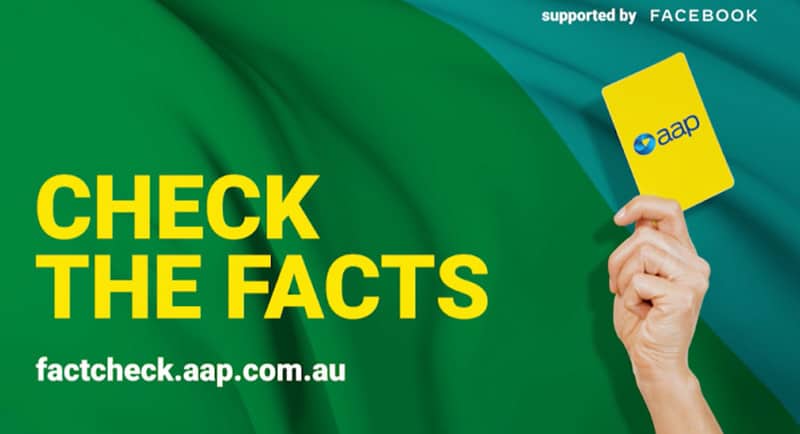Facebook Australia is partnering with the Australian Associated Press (AAP) to launch ‘Check the Facts’, a nationwide media literacy campaign in Australia.
The nationwide social media educational campaign launching October 26 and running until November 24, aims to help inform and empower Australians to understand, identify and prevent the spread of misinformation, as well as how to support those close to them to do the same.
The ‘Check the Facts’ campaign takes the simple concept of the soccer/football ‘Yellow Card’ rules and will feature three videos of everyday situations: an office kitchen chat; weekend BBQ; and date night at home watching TV, whereby one character mistakenly shares a piece of misinformation based on three myths that have been debunked by AAP FactCheck.
The campaign, launched as part of Global Media and Information Literacy Week 2021, aligns with this year’s theme: ‘Media and Information Literacy for the Public Good’.
The videos highlight the following three key tips on how to spot misinformation:
• Who made the claim?
• What’s the evidence?
• What do trusted sources say?
In addition to the campaign videos, AAP has developed static images and four resources which will be housed on the AAP FactCheck website. These resources will further inform and empower people to proactively identify and avoid misinformation. They cover:
• Defining misinformation and media literacy: Explains what misinformation is and its common characteristics, and defines media literacy and why it is important.
• How to ‘Check the Facts’: AAP’s professional fact-checkers break down how anyone can identify misinformation through three key questions.
• What is a trusted source?: How to identify what sources you can rely on in the information age.
• How to spot visual misinformation: A beginner’s guide on how to spot a fake image.
Josh Machin, head of public policy for Facebook in Australia said: “We are proud to be partnering with AAP who are one of Facebook’s third party fact-checking partners in Australia. We know that it can be challenging sometimes to identify misinformation on social media, especially when linked to COVID-19, which is why this initiative is so timely. The levity in the campaign is to get people’s attention in a creative way – so that we can work with AAP to do the serious job of raising awareness and improving knowledge on this important topic.
“Connecting people to accurate information is extremely important to Facebook and this campaign aims to provide people with new skills to make informed decisions on what to read, trust and share.”
Peter Bodkin, editor for AAP FactCheck said: “The growing problem of misinformation is compounded by the fact many Australian adults lack confidence in their ability to identify false or misleading information. There are limited media literacy education resources targeting adults, which led us to partner with Facebook to create this important campaign. In it we share three fundamental questions we use in our fact-checking processes. The very act of pausing and considering those questions can help build the critical thinking skills needed to recognise and avoid misinformation.”
Emma Cowdroy, CEO of AAP said: “AAP has been committed to fact-based journalism for more than 85 years but our new mission as a not-for-profit newswire drives us to support Australians to build their media literacy skills as we continue to serve them by combating misinformation circulating online and in the community.”
